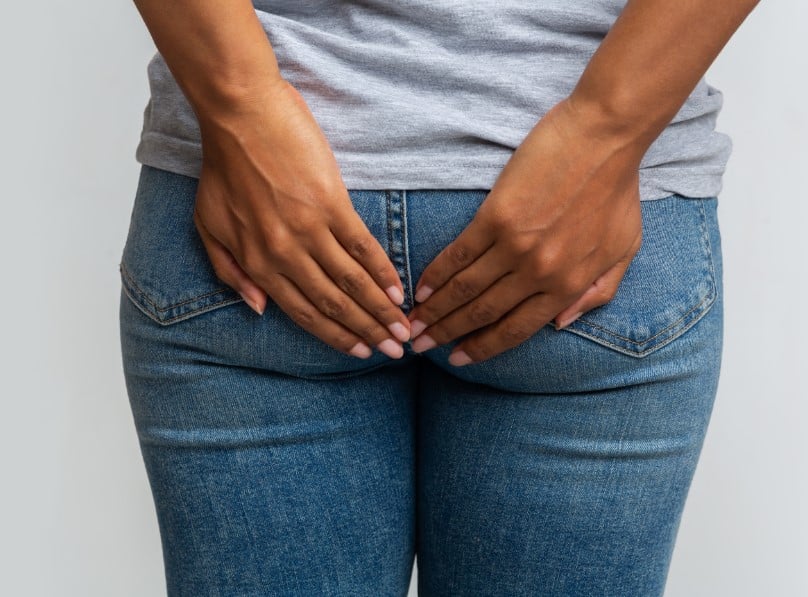Pregnancy comes with a lot of physical and physiological changes which can be challenging. As an expecting mom, there is a tendency to always be on guard about the latest changes you experience. You don’t want anything to go wrong and you certainly don’t want to leave anything to chance.
It is always distressing to find blood in your stool, and if you’re pregnant, you’re likely to be more concerned. Thankfully, except in extreme cases, most instances of bloody stool during pregnancy are fairly harmless and usually don’t require a medical emergency. In fact, most cases of bloody stool during pregnancy are a result of common pregnancy ailments.
Read this post to find out what causes blood in stool during pregnancy, how you can manage it, and when to seek medical treatment. Keep reading!
What Causes Rectal Bleeding / Bloody Stool During Pregnancy?
For most women, seeing blood in stool during pregnancy at some point is not such a strange sight. Most times, this results from hemorrhoids and anal fissures which are not serious conditions. In rare cases, however, bloody stool in pregnancy can be caused by serious conditions like inflammatory bowel disease and in extremely rare cases, cancer. While hemorrhoids and anal fissures can be very uncomfortable, they are almost always just pregnancy discomfort.
Hemorrhoids
Hemorrhoids occur when the blood vessels around your anus and rectum break down or swell up. They are common during pregnancy (affecting up to 30% of pregnant women), particularly during the last trimester, and in the following weeks after giving birth. Pregnancy hemorrhoids are caused by increased pelvic pressure, which can occur due to straining while pooping or because of your growing uterus.

One factor that makes hemorrhoids more likely during pregnancy is constipation. In addition, some women are more susceptible due to genetics. Sometimes, when you strain during a bowel movement or rub too hard when you wipe, you may notice blood. This is because the broken or otherwise swollen blood vessels bleed. Here are common symptoms of hemorrhoids to watch out for:
- Bright red blood in the stool.
- Small, tender lumps close to the anus.
- Pain when sitting.
- Itchiness and soreness around the anus.
Anal Fissures
These are small tears in your anus that are caused by constipation or straining while pooping. Anal fissures can also be caused by other conditions such as inflammatory bowel disease, STDs, frequent diarrhea, and anal sex. Pregnant women are more prone to constipation, hence, anal tears are quite common in pregnancy. Generally, anal fissures are harmless and usually only last about 6 weeks, but more serious anal fissures can become chronic.
Common symptoms of anal fissures include:
- Anal pain.
- Pain during and after pooping.
- Light bleeding during or after pooping.
Other Possible Causes of Blood in Stool During Pregnancy
Although hemorrhoids and anal fissures are the main culprits behind bloody stool in pregnancy, there can be other causes as well. These include:
- Stomach viral or bacterial infection which can cause diarrhea
- Inflammatory bowel disease which can be exacerbated during pregnancy
- Colorectal cancer (in rare cases)
- Vitamin deficiencies
Home Treatments for Bloody Stool
The best approach to treating bloody stool during pregnancy is to treat the conditions that are most likely to cause it. In this case, constipation is the underlying condition that needs to be addressed to reduce the occurrence of anal fissures and hemorrhoids.
Treatment for Constipation
Constipation during pregnancy can be treated by following these tips:
- Incorporate a lot of fiber into your diet
- Drink extra fluids
- Regular exercise and physical movement
- With a doctor’s approval, try using a laxative or stool softener
- Take fiber supplements
- Probiotics
In addition, you can discuss with your doctor about trying a prenatal vitamin in case your constipation is a result of vitamin deficiency.
After addressing constipation as a problem, you will want to treat the anal fissures and hemorrhoids themselves as well.

Treatment for Anal Fissures and Hemorrhoids During Pregnancy
Some common ways to treat anal fissures and hemorrhoids during pregnancy include:
- Taking a sitz or warm bath for up to 10-15 minutes two to three times per day.
- Topical analgesics with the permission of your healthcare provider.
- Epsom salt baths.
- Hemorrhoids creams and suppositories
- Using a hemorrhoid pillow for comfort
- Avoid straining when passing stool
- Wipes and Pads soaked in witch hazel.
When to Call a Doctor About Hemorrhoids and Anal Fissures During Pregnancy
Most times, seeing blood in your stool while pregnant is not usually a cause for alarm. Nonetheless, be sure to speak to your healthcare provider when you notice bright red blood on your underwear or toilet paper. This is because you may not be able to tell if the blood is from your vagina or your anus. A medical practitioner is in the best position to give you better insight.
Also, if you’re concerned that your bleeding is excessive or you’re experiencing pregnancy complications, you should visit an emergency room as soon as you can.
Conclusion
Noticing blood after pooping during pregnancy can be unnerving, but don’t worry, the feeling is understandable. You must share your symptoms with your healthcare provider. Just know that a doctor or other healthcare professional will not be surprised, as bloody stool is quite common during pregnancy.
In the vast majority of cases, your doctor will diagnose anal fissures or hemorrhoids, and they will give you tips on how to manage these conditions. Typically, treatments targeted at constipation are enough to manage these conditions but to be on the safe side, your doctor will also suggest treatments to tackle anal fissures and hemorrhoids themselves.
If your doctor suspects that there are other causes responsible for blood in your stool, they will discuss further testing with you as well as your treatment options.

